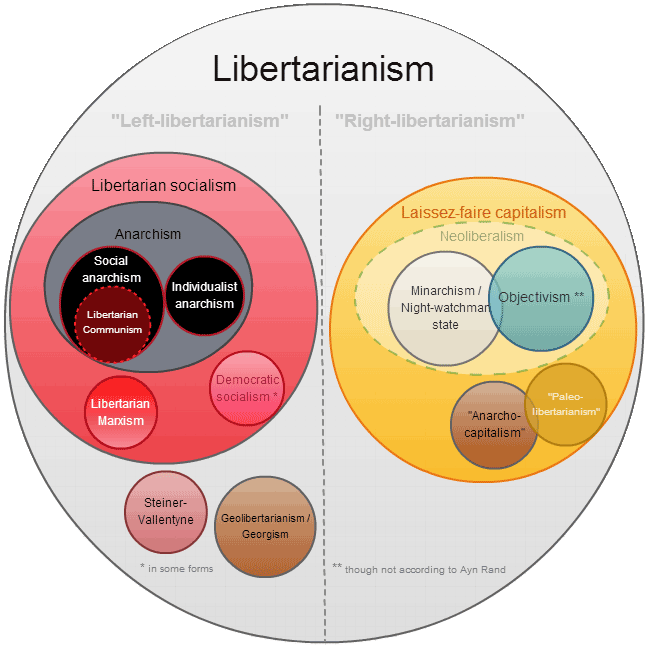
Libertarianism
Libertarianism (from French: libertaire, itself from the Latin: libertas, lit. 'freedom') is a political philosophy that upholds liberty as a core value.[1][2][3][4] Libertarians seek to maximize autonomy and political freedom, emphasizing equality before the law and civil rights to freedom of association, freedom of speech, freedom of thought and freedom of choice.[4][5] Libertarians are often skeptical of or opposed to authority, state power, warfare, militarism and nationalism, but some libertarians diverge on the scope of their opposition to existing economic and political systems. Various schools of libertarian thought offer a range of views regarding the legitimate functions of state and private power. Different categorizations have been used to distinguish various forms of Libertarianism.[6][7] Scholars distinguish libertarian views on the nature of property and capital, usually along left–right or socialist–capitalist lines.[8] Libertarians of various schools were influenced by liberal ideas.[9]
For other uses, see Libertarianism (disambiguation). "Libertarians" redirects here. For political parties, see List of libertarian political parties.
In the mid-19th century,[10] libertarianism originated as a form of left-wing politics such as anti-authoritarian and anti-state socialists like anarchists,[11] especially social anarchists,[12] but more generally libertarian communists/Marxists and libertarian socialists.[13][14] These libertarians sought to abolish capitalism and private ownership of the means of production, or else to restrict their purview or effects to usufruct property norms, in favor of common or cooperative ownership and management, viewing private property as a barrier to freedom and liberty.[19] While all libertarians support some level of individual rights, left-libertarians differ by supporting an egalitarian redistribution of natural resources.[20] Left-libertarian[26] ideologies include anarchist schools of thought, alongside many other anti-paternalist and New Left schools of thought centered around economic egalitarianism as well as geolibertarianism, green politics, market-oriented left-libertarianism and the Steiner–Vallentyne school.[30] After the fall of the Soviet Union, libertarian socialism grew in popularity and influence as part of anti-war, anti-capitalist and anti- and alter-globalisation movements.[31][32]
In the mid-20th century, American right-libertarian[35] proponents of anarcho-capitalism and minarchism co-opted[13] the term libertarian to advocate laissez-faire capitalism and strong private property rights such as in land, infrastructure and natural resources.[36] The latter is the dominant form of libertarianism in the United States.[34] This new form of libertarianism was a revival of classical liberalism in the United States,[37] which occurred due to American liberals' embracing progressivism and economic interventionism in the early 20th century after the Great Depression and with the New Deal.[38] Since the 1970s, right-libertarianism has spread beyond the United States,[39] with right-libertarian parties being established in the United Kingdom,[40] Israel,[41][42][43][44] South Africa[45] and Argentina.[46] Minarchists advocate for night-watchman states which maintain only those functions of government necessary to safeguard natural rights, understood in terms of self-ownership or autonomy,[47] while anarcho-capitalists advocate for the replacement of all state institutions with private institutions.[48] Some right-wing variants of libertarianism, such as anarcho-capitalism, have been labeled as far-right or radical right by some scholars.[49][50][51][52] Right-wing libertarian ideals are also prominent in far-right American militia movement associated with extremist anti-government ideas.[53]
Traditionally, libertarian practice has taken extra-parliamentary form, such as in the Spanish Revolution of 1936, the New Left, the Zapatista uprising, the Tea Party movement, and the Rojava Revolution. In 2022, student activist and self-described libertarian socialist Gabriel Boric became head of state of Chile after winning the 2021 Chilean presidential election with the Apruebo Dignidad coalition.[54][55][56] In 2023, Argentine economist Javier Milei became the first openly right-wing libertarian head of state,[57] after winning that year's general election with the La Libertad Avanza coalition.[58]